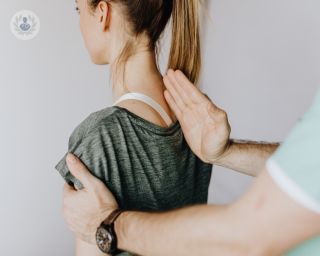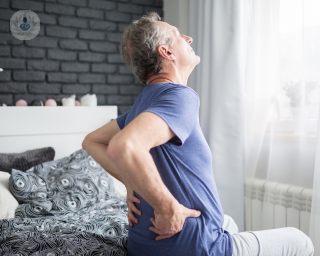Back injuries
Mr G Michael Hess - Orthopaedic surgery
Created on: 02-05-2013
Updated on: 08-02-2023
Edited by: Conor Lynch
What are back injuries?
Back injuries may be caused by work, exercising, or an accident. Back injuries and back pain normally happen in the lower back.
Some common symptoms include:
- Lower back pain or lumbago
- Aching or sharp pains
- Inability to stand up straight
- Muscle spasms
These injuries can cause pain and limit movement, depending on the severity of the injury.

What is the outlook for back injuries?
Back injuries do not tend to be serious as long as they are treated correctly and the right amount of rest is taken. If an injury has been causing issues for more than six weeks, it is important to get it seen to so a specialist can assess it. If more serious injuries are not treated early on, they can go on to cause chronic pain and complications.
What are the symptoms?
Symptoms may appear in different ways. This will depend on the seriousness and area of the injury.
The most common symptoms include:
- Muscle discomfort
- Throbbing back pain
- Limitation of back movement (flexibility and range)
- Burning or tingling
- Intense pain
Some people may have referred pain due to a back injury. It most commonly affects the legs, hips, or the sole of the foot.
What medical tests are performed to diagnose the back injury?
An investigation of the spine needs to be carried out in order for the specialist to diagnose a back injury. Depending on the symptoms being experienced, the specialist may opt to use certain tests, such as an X-ray, an MRI, or a CAT scan to be able to see the affected area better.
What causes back injuries?
Back injuries can be caused by bad posture. Sport and traffic accidents are also a common cause of back injuries.
Other causes can include:
- Being in poor physical shape
- Obesity
- Lifting heavy weights
- Sitting for long periods of time
- Osteoporosis
- Internal diseases, such as infections or kidney stones
- It is occasionally related to stress
How can back injuries be prevented?
Learning good posture habits is very important. This is just as important when sitting or when lifting heavy things. People who work with heavy loads should use the appropriate protective equipment (shoes, gloves, lumbar belt, and so on). If exercising, it is important to warm up and stretch beforehand. These stretches should be repeated upon finishing exercising.
What is the treatment for back injuries?
Many back injuries improve or disappear on their own (within one to four weeks). Treatment will depend on the seriousness and type of injury, as well as the patients’ age, the location of pain and the kinds of activities that the patient carries out (work, sport, etc.).
Conservative treatment is normally used, this may include:
- Rest
- Localised heat pads
- Painkillers, anti-inflammatories, or muscle relaxants
- Rehabilitation exercises
- Massages
In more severe cases, surgery may be recommended.
What specialist should I see?
Back injuries tend to be treated by orthopaedic surgeons and physiotherapists.








